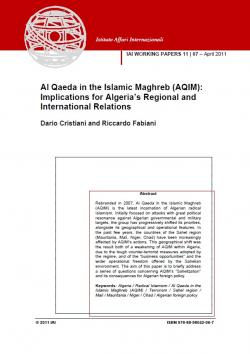Al Qaeda in the Islamic Maghreb (AQIM): Implications for Algeria's Regional and International Relations
Rebranded in 2007, Al Qaeda in the Islamic Maghreb (AQIM) is the latest incarnation of Algerian radical Islamism. Initially focused on attacks with great political resonance against Algerian governmental and military targets, the group has progressively shifted its priorities, alongside its geographical and operational features. In the past few years, the countries of the Sahel region (Mauritania, Malì, Niger, Chad) have been increasingly affected by AQIM's actions. This geographical shift was the result both of a weakening of AQIM within Algeria, due to the tough counter-terrorist measures adopted by the regime, and of the "business opportunities" and the wider operational freedom offered by the Sahelian environment. The aim of this paper is to briefly address a series of questions concerning AQIM's "Sahelization" and its consequences for Algerian foreign policy.
-
Dati bibliografici
Roma, Istituto Affari Internazionali, aprile 2011, 14 p. -
Numero
11|07 -
ISBN/ISSN/DOI:
978-88-98042-06-7
1. Introduction
2. The evolution and internationalization of AQIM
3. The determinants of AQIM’s tactical and strategic evolution
4. AQIM's regional and international impacts: a new role for Algeria?
5. Conclusions
References




